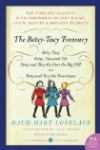11
Followers
23
Following
Reading Slothfully
I was told in elementary school that I only could read at half the speed for success in college. Oh well, one benefit of slow reading is you get to live with the characters a longer period of time. I read in a vain attempt to better understand people. At my other homes, I'm known as a spouse, pop, guy in the choir, physical chemist, computer/web dilettante and child-care provider. In theory, I'm a published author, if you consider stuff like Quenching Cross Sections for Electronic Energy Transfer Reactions Between Metastable Argon Atoms and Noble Gases and Small Molecules to count as publications. I've strewn dozens of such fascinating things to the winds.
Currently reading
Twenty Thousand Leagues Under the Seas
The Spirit of the Border
Ramona the Brave (Ramona, #3)
The Underground Man (Vintage Crime/Black Lizard)
Delilah of the Snows
Mrs. Miniver
Betsy-Tacy Treasury (P.S.)
A Christmas Carol
The Way Some People Die
Envy of Angels
Mansfield Park
 It just seemed to me that it was time to read some Jane Austen. The one of her works I know the least is Mansfield Park. And so, I picked it up. Austen, is a bit like Dickens, in that she never uses three words to describe something if twenty words would suffice perfectly well. So, the book is a bit wordy and perhaps a bit moralistic. But it's still a nice enough story.
It just seemed to me that it was time to read some Jane Austen. The one of her works I know the least is Mansfield Park. And so, I picked it up. Austen, is a bit like Dickens, in that she never uses three words to describe something if twenty words would suffice perfectly well. So, the book is a bit wordy and perhaps a bit moralistic. But it's still a nice enough story. One thing that rings out clearly from books like this is how inherited wealth creates a whole class of useless people. It's a pretty common, between-the-lines, theme of pre-Victorian and Victorian literature, because such books are full of useless people who think themselves of consequence merely by dint of their inheritances, not for any reasons of personal merit. And so it goes on today. Would that all inheritance above a certain level were essentially confiscated, our world would be a better place. But I digress.
This story relates the life on Fanny Price. She is the oldest daughter of one of three sisters, the black-sheep sister, so to speak. One of the other sisters, Mrs. Norris, an unmitigated busy body (like the cat of the same name in Harry Potter), decides that they should "do something" for their poor sister, and so convinces the third sister, the vapid and indolent Lady Bertran, to take Fanny into her household. There, Fanny is basically ignored or looked down upon by all, except for her cousin Edmund, the second son of the family, and thus the son who won't inherit anything of consequence.
So time goes on, Fanny grows up, her girl cousins grow up and start looking for husbands (that's what girls did in the olden days). Various vapid, indolent, and self-indulgent people wander through the scenes; a few earnest, good ones also. Things unfold and the good people live happily enough ever after, and the not-so good ones, fare less well.
I dunno, I can't do it justice. Although this isn't Jane Austen's best, it's good enough. Everyone should read it. If you really want to check the story out in depth without reading the story, head over to the Mansfield Park blog.
It always interests me how language changes. One of the young ladies in this book, Fanny Price, actually, goes to some social event and gets "knocked up". Literally, that's the phrase Austen uses to describe Fanny's exhaustion after the event. Now days, of course, if a young woman were "knocked up" at a social event, we'd think something entirely different. Kinda like Cole Porter's The Gay Divorcee — originally The Gay Divorce but they changed the name to get by movie censors — would have a completely different meaning (whatever it's titled) were it to have been written in the last ten years.
 1
1













